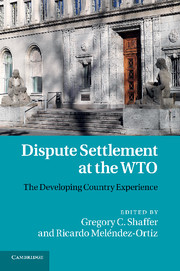Book contents
- Frontmatter
- Contents
- List of tables
- List of figures
- List of contributors
- Preface: The ICTSD dispute settlement project
- Introduction
- Part I Case Studies from South America
- Part II Case Studies from Asia
- 3 China's experience in utilizing the WTO Dispute Settlement Mechanism
- 4 Learning from the India–EC GSP dispute: the issues and the process
- 5 Thailand's experience in the WTO dispute settlement system: challenging the EC sugar regime
- 6 How the DSU worked for Bangladesh: the first least developed country to bring a WTO claim
- Part III Case Studies from Africa
- 10 Conclusion
- Index
- References
4 - Learning from the India–EC GSP dispute: the issues and the process
Published online by Cambridge University Press: 07 September 2011
- Frontmatter
- Contents
- List of tables
- List of figures
- List of contributors
- Preface: The ICTSD dispute settlement project
- Introduction
- Part I Case Studies from South America
- Part II Case Studies from Asia
- 3 China's experience in utilizing the WTO Dispute Settlement Mechanism
- 4 Learning from the India–EC GSP dispute: the issues and the process
- 5 Thailand's experience in the WTO dispute settlement system: challenging the EC sugar regime
- 6 How the DSU worked for Bangladesh: the first least developed country to bring a WTO claim
- Part III Case Studies from Africa
- 10 Conclusion
- Index
- References
Summary
Introduction
Since the inception of the World Trade Organization (WTO) in 1995, India has initiated cases against other countries eighteen times and has been complained against twenty times before the WTO Dispute Settlement Body (DSB), as of the end of 2009. India is therefore one of the most frequent developing country users of the WTO dispute settlement system. This chapter looks at the case where India contested the tariff concessions granted by the European Communities (EC) to twelve developing countries under its Generalised System of Preferences (GSP) scheme (EC – GSP case) to highlight some critical dimensions relating to India's use of the WTO dispute settlement mechanism. Some of the highlighted issues relate to the economic and political factors behind India's decision to challenge the EC, the participation of the industry and private sector stakeholders in India in the case, and measures that the Indian government can take to increase and make stakeholders' participation more effective. The EC – GSP case is chosen to demonstrate these issues as it has significant long-term implications for the trading interests of developing countries, including India's.
On 10 December 2001, the EC launched its new GSP scheme through Council Regulation (EC) No. 2501/2001. The regulation provided for five different preferential tariff preferences, and India was especially concerned with three of them: tariff preferences granted respectively under the special arrangements as reward for some countries' efforts to combat drug production and trafficking (the Drug Arrangements); under the special arrangements for the protection of labour rights (the Labour Arrangements); and under the special arrangements for the protection of the environment (the Environment Arrangements).
- Type
- Chapter
- Information
- Dispute Settlement at the WTOThe Developing Country Experience, pp. 174 - 209Publisher: Cambridge University PressPrint publication year: 2010



